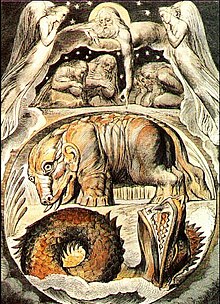leviathan
English

Alternative forms
Etymology
From Middle English levyethan, levyathan, etc., from Late Latin leviathan, a biblical transliteration of Hebrew לִוְיָתָן (liv'yatán).
Pronunciation
Noun
leviathan (plural leviathans)
- (biblical, mythology) A vast sea monster of tremendous strength, described as the most powerful and dangerous creature in the ocean.
- 1611, The Holy Bible, […] (King James Version), London: […] Robert Barker, […], →OCLC, Job 41:1, column 1:
- Canſt thou draw out Leuiathan with an hooke? or his tongue with a corde which thou letteſt downe?
- 1904, Jack London, chapter 1, in The Sea-Wolf (Macmillan’s Standard Library), New York, N.Y.: Grosset & Dunlap, →OCLC:
- The fog seemed to break away as though split by a wedge, and the bow of a steamboat emerged, trailing fog-wreaths on either side like seaweed on the snout of Leviathan.
- (figurative) Something monstrously large or mighty in size, strength, wealth, etc.
- 1840 April – 1841 November, Charles Dickens, “Chapter the Twenty-seventh”, in The Old Curiosity Shop. A Tale. […], volume I, London: Chapman and Hall, […], published 1841, →OCLC:
- When she had exhibited these leviathans of public announcement to the astonished child, she brought forth specimens of the lesser fry in the shape of hand-bills, some of which were couched in the form of parodies on popular melodies, […]
- Template:RQ:Trollope The Warden
- 2020 October 7, Cecilia D'Anastasio, “Amazon Wants to ‘Win at Games.’ So Why Hasn’t It?”, in Wired[1]:
- After brute-forcing its way to dominance in so many industries, the tech leviathan may finally have met its match.
- (political science, sometimes capitalized) The political state, especially a domineering and totalitarian one as theorized by Thomas Hobbes.
Translations
Biblical sea monster
|
Adjective
leviathan (not comparable)
- Very large; gargantuan.
- Synonyms: enormous, giant, ginormous; see also Thesaurus:gigantic
Translations
very large; gargantuan
|
Further reading
 leviathan on Wikipedia.Wikipedia
leviathan on Wikipedia.Wikipedia  Leviathan (Hobbes book) on Wikipedia.Wikipedia
Leviathan (Hobbes book) on Wikipedia.Wikipedia
Categories:
- English terms inherited from Middle English
- English terms derived from Middle English
- English terms derived from Late Latin
- English terms derived from Hebrew
- English 4-syllable words
- English terms with IPA pronunciation
- English terms with audio pronunciation
- Rhymes:English/aɪəθən
- English lemmas
- English nouns
- English countable nouns
- en:Bible
- en:Mythological creatures
- English terms with quotations
- en:Political science
- English adjectives
- English uncomparable adjectives